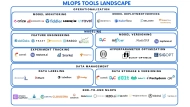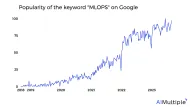ML Metadata Store in 2024: What is it? & Benefits
Adoption of artificial intelligence and machine learning in the enterprise skyrocketed after the pandemic (Figure 1) as AI and ML are changing industries and how businesses function with hundreds of use cases.
Figure 1. AI adoption after the pandemic across different industries
Companies that want to adopt AI and ML models at scale, however, need a systematic approach such as MLOps to model management processes. As Gartner states, nearly half of the ML projects cannot be productized. Lack of a systematic approach is one of the reasons for failure to commercialize ML models.
One of the components of MLOps is a metadata store, which helps ML models to be reproducible. In this article, we’ll explore what a metadata store is, why it is important and how it can be implemented.
What is metadata?
Metadata is the data that includes information about the context of other data and is generated in each phase of the ML lifecycle. From the data extraction to the model monitoring phase, all ML-related processes create specific metadata. For example, the initial part of the ML lifecycle includes metadata regarding the location, name, and version of the dataset; the model training phase includes metadata regarding hyperparameters and evaluation metrics.
What is a metadata store?
An ML metadata store is a centralized structure for storing the metadata of ML models. A metadata store includes information such as the creator of different model versions, when they are created, the training data, parameters, and the place and performance metrics of each version of a model. It also provides information about the environment within which an ML model is built.
Metadata stores facilitate the monitoring, comparison, organization, and filtering of metadata as well as storing it.
Why is it necessary?
The reason for creating a metadata store is directly linked to the iterative nature of ML implementation. Building an ML model does not happen in one stroke. Instead, it is an experimental process that involves lots of trials and errors. In order to develop a well-functioning ML model, it is important to know which aspect of a model is improved or failed, and without the knowledge of the previous versions of a model, it is impossible to make this goal possible.
This is especially important in settings where several data scientist teams are working on ML projects. Without tracking the metadata in a structured manner, ML teams can lose their ability to:
- Create reliable and predictable AI applications,
- Collaborate during ML models development processes.
Through a metadata store, ML teams can:
- Access all the metadata related to an ML model in a centralized platform,
- Visualize comparisons of different versions,
- Shorten the time to track metadata information in a manual manner,
- Protect model metadata.
How does it differ from a feature store?
Even though the function of a feature store and a metadata store enable reproducibility in ML development, they serve different purposes within the ML lifecycle.
Features are attributes of training data that is relevant to the problem at hand. A feature store is a centralized platform that stores features for them to be recalled and reused later.
A metadata store, on the other hand, stores metadata not just about the training dataset and its features but also the model and the model development environment. Therefore, it improves reproducibility over the entire ML lifecycle.
How to implement a metadata store?
Businesses can create their own metadata store, use an open-source tool, or choose one of the available tools on the market. Metadata stores are often a part of data science tools or MLOps platforms.
Feel free to check our article on MLOps tools and our sortable/filterable list of MLOps platforms.
The storage of metadata, however, is only a part of metadata management. There are also metadata management tools that businesses can use to store and manage their ML metadata. Check our article on metadata management to explore specific tools.
We can answer your further questions regarding metadata management and ML metadata stores:

Cem has been the principal analyst at AIMultiple since 2017. AIMultiple informs hundreds of thousands of businesses (as per similarWeb) including 60% of Fortune 500 every month.
Cem's work has been cited by leading global publications including Business Insider, Forbes, Washington Post, global firms like Deloitte, HPE, NGOs like World Economic Forum and supranational organizations like European Commission. You can see more reputable companies and media that referenced AIMultiple.
Throughout his career, Cem served as a tech consultant, tech buyer and tech entrepreneur. He advised businesses on their enterprise software, automation, cloud, AI / ML and other technology related decisions at McKinsey & Company and Altman Solon for more than a decade. He also published a McKinsey report on digitalization.
He led technology strategy and procurement of a telco while reporting to the CEO. He has also led commercial growth of deep tech company Hypatos that reached a 7 digit annual recurring revenue and a 9 digit valuation from 0 within 2 years. Cem's work in Hypatos was covered by leading technology publications like TechCrunch and Business Insider.
Cem regularly speaks at international technology conferences. He graduated from Bogazici University as a computer engineer and holds an MBA from Columbia Business School.
To stay up-to-date on B2B tech & accelerate your enterprise:
Follow on

Comments
Your email address will not be published. All fields are required.